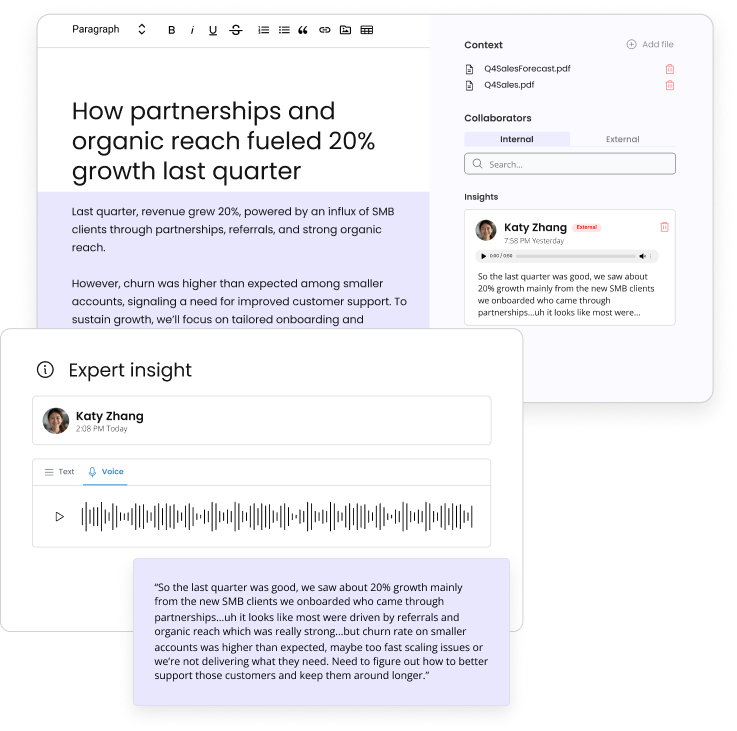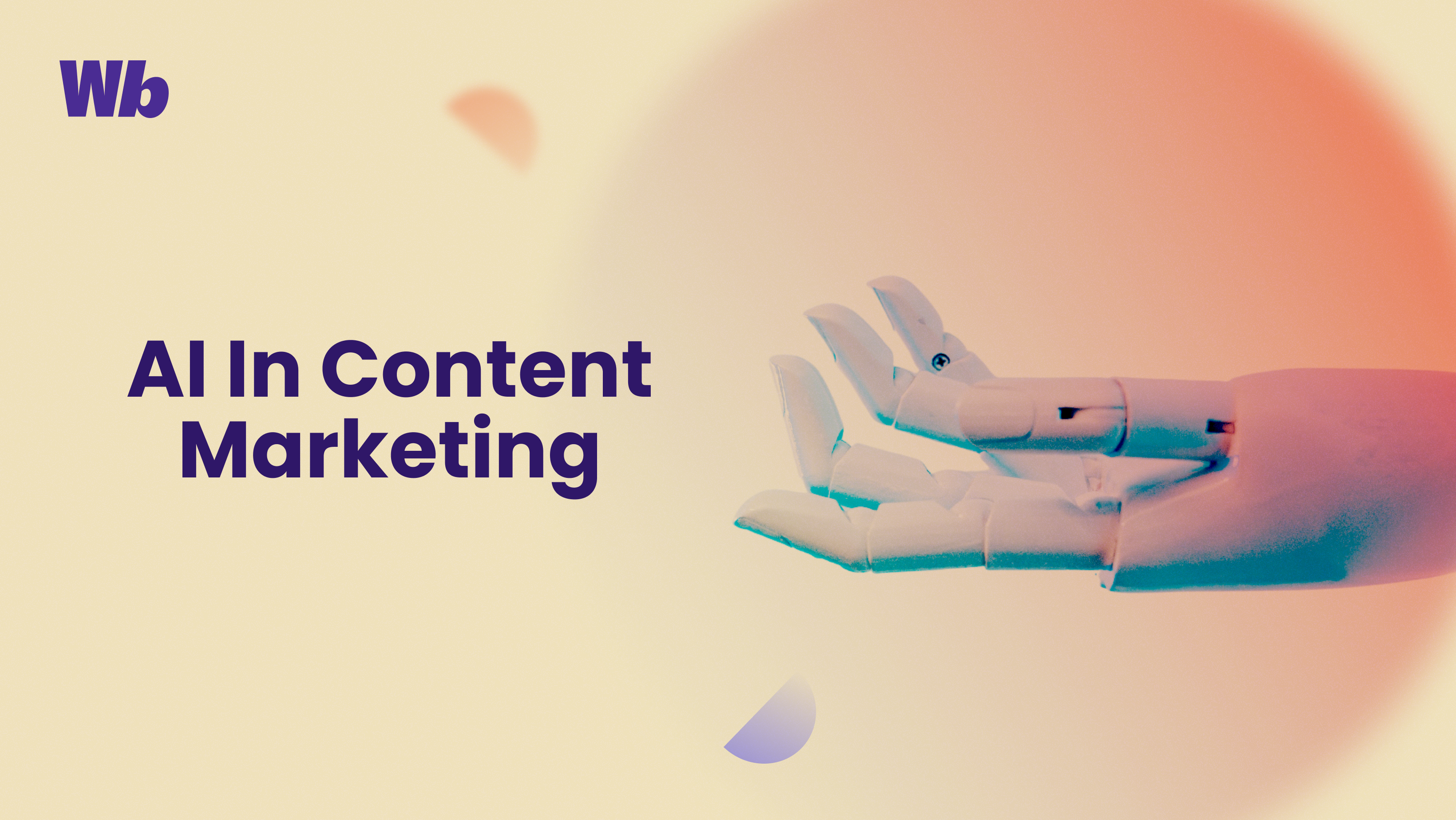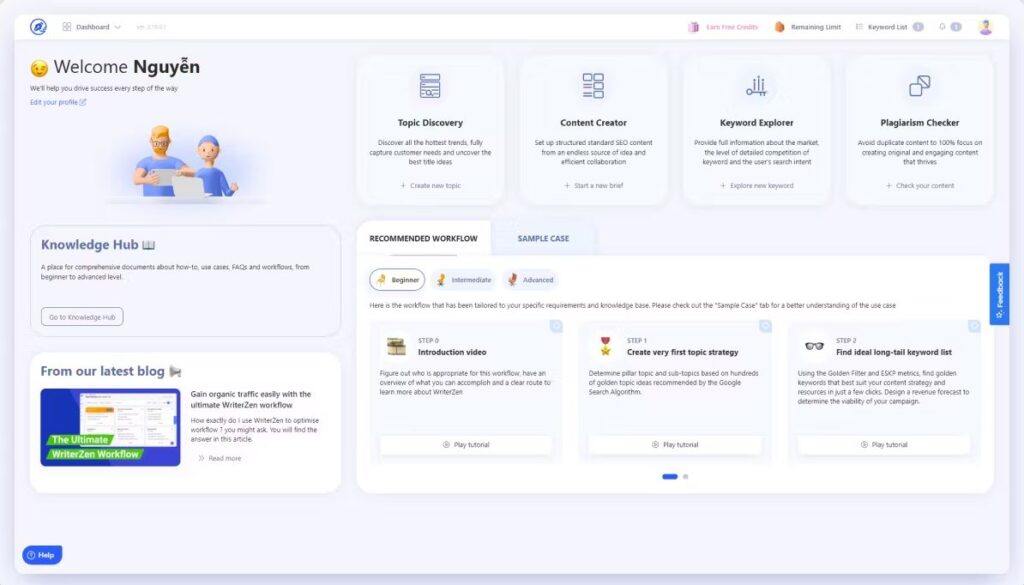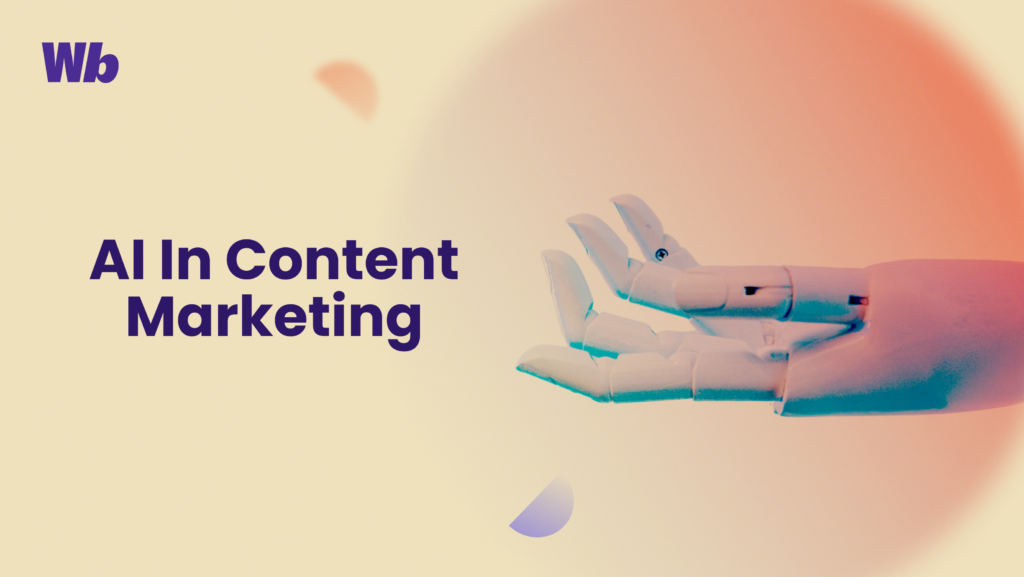Table of Contents

Authority scales when expertise comes first
Wordbrew helps teams collect expert insight before AI ever writes a word.
Built for expert-led, review-safe content
- Home
- »
- Hybrid Content
- »
- How to use AI in content marketing strategically
-
Wordbrew
- 11 minutes read time
How to use AI in content marketing strategically
- Home
- »
- Hybrid Content
- »
- How to use AI in content marketing strategically
How to use AI in content marketing strategically
Table of Contents


As Artificial Intelligence (AI) carves deeper inroads into diverse industries, its role in content marketing becomes increasingly indispensable. For forward-thinking marketers, AI isn’t just a shiny new toy—it’s a powerful co-pilot for content creation.
In a recent survey conducted by Wordbrew, an astonishing 96% of content marketers revealed that they incorporate AI into their content creation strategy. This underscores AI’s pivotal role in the modern content landscape.

Moreover, in pursuit of impactful storytelling, AI offers both a challenge and an opportunity in content creation. While it might not capture the full essence of human creativity, it brings a suite of tools and tactics that can amplify our content marketing efforts.
Through expert insights and real-world applications featured in this article, we’ll explore the ways AI is championed in content marketing—unraveling its potential and pinpointing specific strategies that harness the best of AI and human ingenuity.
The role of AI in content marketing
Think about a world where your content strategy, backed by intricate algorithms, always hits the mark. Sounds futuristic? Today, it’s a reality: Artificial intelligence is no longer a techy catchphrase on the fringes—it’s something every marketer needs in their toolkit.
AI’s magic in content marketing lies in its ability to simplify complex tasks, saving you valuable time, resources, and money. It allows us to harness real-time insights from your audience’s online behavior and then tailor content that speaks directly to their needs.

Not only that, it churns through vast data sets, like sales metrics and website traffic, and hands you golden nuggets of information to help you create content at lightning speed. The result? More impactful and resonant content without the manual headache.
But let’s zoom into a hot topic in marketing right now: AI-powered content creation.
While nothing can replace the human touch in storytelling, AI acts as a reliable sidekick. It’s the magnifying glass that zeroes in on what your audience wants. From crafting tailored content briefs to marrying SEO data with semantic analysis, AI tools are redefining the boundaries of what’s possible.
Curious about AI’s prowess in content creation? Take a look at this in-depth guide on AI for content creation and discover the future, today.
Why you should use AI in content creation
In content marketing, embracing artificial intelligence has shifted from a trend to a genuine game-changer. With its vast capabilities, AI tools are redefining how we craft, deliver, and optimize content, setting new standards for engagement and efficiency.
Driven by this revolution, we’ve entered the era of hyper-personalization. AI intricately analyzes data to tailor content that resonates deeply with individual preferences. This goes beyond engagement; it crafts an experience where every piece feels uniquely curated for its reader, amplifying the connection and interaction.

Beyond the ability to create content, AI enhances user experiences on digital platforms. Remember those intuitive website suggestions? That’s AI at play, smartly recommending content and services based on a user’s history. These seemingly small touches dramatically streamline the user journey, turning fleeting visits into lasting engagements.
But where AI truly shines is in its automation capabilities. From efficiently scheduling content to detailing performance evaluations, the precision it delivers is unparalleled. Even in large-scale communications, AI ensures a touch of personalization, making bulk emails feel individually tailored.
In the end, integrating AI in content marketing isn’t just a strategy—it’s the path forward for anyone serious about creating meaningful and effective content. With that in mind, let’s take a deeper look into the ways AI supercharges content strategies:
Content personalization

(Source: Wordbrew)
AI doesn’t just generalize—it personalizes. By analyzing intricate user data, AI crafts content that feels tailor-made for the individual. Take hybrid content as a service, for instance. This new wave, as showcased by platforms like Wordbrew, curates content not just by topic but by user interaction, making each piece feel hand-picked for the reader. Each piece is crafted according to the brand guidelines, allowing companies to attract the right type of audience at each stage of the content marketing funnel.
Enhanced user experience
Ever felt a website just “gets you?” That’s AI’s doing. By recommending content and products, AI ensures every user finds what they’re looking for, strengthening their loyalty in the process.
Seamless content scheduling
With AI, the days of manual scheduling are behind us. It automates content posting, guaranteeing a consistent brand voice across platforms without human oversight.
In-depth performance analysis
Beyond mere metrics, AI deeply analyzes content performance. It’s not just about views or clicks—it’s understanding why a piece succeeded or faltered and then charting a path forward.
Efficient communication scaling
AI can manage huge communication volumes, making every message—especially in email marketing—feel personal. No generic mailers; every message is spot on.

(Source: Semrush)
Smart SEO
AI’s understanding of search trends and user behaviors allows content to be primed for search engines. It’s not about gaming the system, but about ensuring quality content gets the visibility it deserves.
Responsive chatbots
Gone are the days of stale, robotic chat interfaces. Today’s AI-powered chatbots converse with fluidity, addressing customer queries instantly and accurately, elevating the overall user experience.
To wrap up: It’s clear that embracing AI is more than just keeping pace with the future—it’s about unlocking unprecedented potential in content marketing and ensuring your message isn’t just heard, but deeply felt.
AI in assembling content briefs
Crafting a content brief is pivotal in content marketing, setting the stage for the entire content creation journey. But building a thorough brief often means sifting through mounds of data.
Not only do AI tools save time by swiftly consolidating this data into a precise content brief, but they are also ideal for brainstorming, helping marketers generate content ideas, draft the initial content versions, and refine them based on the brief.
But AI doesn’t stop at data gathering. It also fosters seamless teamwork in the content creation phase. It verifies that all team members align their efforts by offering a unified dashboard filled with vital insights and guidelines.
Tools like WriterZen and Narrato exemplify this by leveraging AI to draft semi-automated content briefs, merging keywords, semantic analysis, and team inputs, resulting in a brief that’s both detailed and tailored for the task at hand.
Looking for a deeper insight? Here’s a walkthrough of some concrete examples of how you can use AI in the assembly of content briefs:

(Source: Hubspot)
Identify the objectives: Begin by pinpointing your content goals. AI tools like HubSpot’s Analytics can analyze past content metrics to guide your new objectives.

(Source: MarketMuse)
Gather relevant data: Leverage AI, like MarketMuse’s Content Intelligence and Strategy platform, to pull together crucial audience details, SEO specifics, and a competitor rundown, grounding your brief in meaningful insights.

(Source: Ahrefs)
Use AI for keyword research: Tools such as Ahrefs‘ Keyword Explorer lean on AI to unearth trending subjects and pivotal keywords, boosting your content’s findability.

(Source: Voiceflow)
Implement semantic analysis: Zoom into the semantics using platforms like TextRazor. These tools grasp the nuance and context of your topic’s terminology to ensure a strong audience connection.

(Source: Trello)
Collate team inputs: With platforms like Trello’s AI-assisted project management, assimilate feedback from the crew to guarantee a holistic brief outlook.

(Source: WriterZen)
Draft the content brief: WriterZen is a prime example here. By consolidating the amassed insights, it produces a preliminary content brief inclusive of goals, pivotal keywords, and audience specifics.

(Source: Grammarly)
Incorporate AI-powered grammar checks: With Grammarly or Narrato, run thorough grammar sweeps and get language optimization tips that lead to a precise, error-minimized brief.

(Source: Bot Penguin)
Review and refine: Post team perusal of the AI-drafted brief, Kuki chatbot can efficiently incorporate critiques, merging all standpoints seamlessly.
Finalize the content brief: With the combined capabilities of the above tools, perfect your content brief with its clarity, completeness, and data anchorage in check.

(Source: Slack)
Distribute the final content brief: Platforms like Slack, with its AI-enhanced notification system, can relay the finalized content brief to all stakeholders, synchronizing everyone’s content creation efforts.
In summary, embracing AI in our content briefing isn’t just smart—it’s revolutionary. Brands can craft content that not only speaks but truly connects with its audience too.
AI in proofing content
Proofreading is more than just a final check; it’s pivotal in establishing brand authority. Every error, no matter how small, can diminish the credibility of content, and by extension, the trustworthiness of a brand. In an age where digital impressions matter immensely, impeccable content is non-negotiable.
AI-powered tools play a crucial role in this precision-driven environment. While Grammarly is widely recognized for its prowess in catching grammar nuances, other platforms like ProWritingAid and Hemingway Editor provide insights into writing style and readability, respectively. These tools don’t just flag errors; they offer a comprehensive content audit, confirming both correctness and effectiveness.
Brands can consistently deliver polished content by leveraging such AI-powered resources. This commitment to quality not only enhances audience engagement but also fortifies a brand’s reputation as a reliable and authoritative voice in its domain.
AI in diversifying content marketing tactics
AI is the crossroads of innovation and content marketing, offering breakthrough tools that transform traditional strategies and tailor content to our audience’s preferences. Here’s a closer look at how AI diversifies and enhances content marketing tactics.
Transforming text to multimedia
Who said content marketing is only about writing? AI is bridging the gap between text and visuals in fascinating ways. Tools like DallE can whip up creative visuals from mere text prompts. This text-to-image technology is rapidly advancing, allowing marketers to transform written ideas into compelling visuals instantly. It’s handy for creating infographics, blog headers, and promo images that align with the text.
Embracing video content
Video has always been a powerhouse, and AI is taking it up a notch. We can now morph our articles into lively videos—complete with animations, voiceovers, and curated visuals. It’s a fresh way to present content and cater to our audience’s diverse preferences.
Amplifying and distributing content efficiently
AI plays a pivotal role in content promotion, pinpointing the best times and platforms for content sharing and ensuring it reaches the right eyes and ears. For more on this, take a peek at our articles on content amplification and content distribution.
Offering real-time adjustments and feedback
One of AI’s most prized perks? It keeps its fingers on the pulse. By monitoring audience interactions, it offers insights for instant strategy tweaks. That way, we make sure our content isn’t just viewed—it genuinely resonates.
In a nutshell, AI’s integration into content marketing tactics amplifies their potential. Armed with these tools and techniques, the domain of content marketing is set to be more creative, efficient, and impactful.
Maximizing ROI with AI-powered content analytics

While AI greatly aids the creation and distribution of content, its role doesn’t end there. It’s also a potent tool for evaluating the effectiveness of your content marketing endeavors. In this section, we’ll dive into how AI-powered content analytics can be a key player in maximizing your return on investment (ROI).
Understanding the power of AI in analytics
At its core, content marketing is about resonating with the audience and triggering desired actions. But how do you gauge its success? This is where AI-powered content analytics can help. Beyond basic metrics like clicks and views, AI dives into understanding user behaviors, engagement patterns, and conversion trends.
For instance, AI can analyze the following:
- How users interact with your content (e.g., where they drop off in a video or blog post).
- Emotional responses triggered by content (via sentiment analysis).
- Predictive patterns, indicating which content will likely perform well in the future.

Leveraging AI for in-depth content insights
Various tools like Google Analytics, Semrush, and BuzzSumo employ AI to provide a more granular understanding of content performance.
Here’s how they reshape our analytical approach:
- Segmentation and personalization: AI can segment users based on behavior, allowing for content personalization strategies that target specific user groups.
- Predictive analysis: AI tools can forecast content trends to help strategists stay ahead of the curve.
- Sentiment analysis: Understanding the sentiment behind user comments and feedback provides insights into audience perceptions.
- Competitor benchmarking: AI not only analyzes your content but also benchmarks it against competitors, identifying gaps and potential areas of improvement.

(Source: AgencyAnalytics)
Optimizing future strategies
Based on the insights garnered, AI suggests actionable steps for refinement in your content marketing strategy:
- Content calibration: AI can recommend topics, content formats, or distribution channels that are likely to resonate more with the audience.
- Enhanced personalization: Based on user segmentation, AI can suggest ways to make content more personalized, thus boosting engagement.
- Improved ROI: By understanding which content pieces drive conversions and which don’t, marketers can allocate resources more effectively to ensure a better ROI.
Case study: AI-powered content in action
Consider a brand that used AI analytics and realized its long-form content outperformed short articles. Based on this, they shifted their strategy to produce in-depth guides, which subsequently increased their site’s average session duration and led to better conversions.
This is a simple yet potent illustration of how AI-driven insights can directly impact strategy and outcomes.
Summing up this section
Embracing AI in content analytics is a strategic move for any brand. By providing a clearer picture of what truly resonates with audiences, AI ensures that your content strategies are based on data-driven insights rather than assumptions.
When AI analytics merge with human intuition, the two pave the way for content that not only attracts but also deeply engages and converts.
AI content marketing tools (examples)
The wonders of AI have breathed life into many content marketing efforts and processes. It’s about more than automating tasks—it’s about introducing innovative methods to brainstorm, draft, and refine content. This aids marketers in producing content swiftly, allowing them more time to focus on overarching strategies.
Here are tangible ways companies are using AI to supercharge the content marketing strategy of brands:

WordBrew: Pioneers in hybrid content creation, this platform teams up with generative AI to produce speedy base drafts of content tailored to a brand’s unique voice. Subject matter experts then refine these drafts, ensuring authenticity and precision. The result? Scalable content that resonates with audiences and excels in search rankings.
Chatbots like Drift: They’re revolutionizing how companies interact with website visitors. Drift, for instance, offers real-time conversations, accelerating visitors down the funnel and enhancing data collection simultaneously.
Curata: An AI-driven content curation platform, it recommends the best content to be included in email newsletters. This allows brands to create content that is tailored to their subscribers’ interests, which leads to increased engagement.
Copy.ai: This platform excels in social media copy creation. When fed a brief description or topic, it generates engaging social media posts that are tailored to different platforms, guaranteeing consistency and relevance in brand messaging across channels.
Brandwatch: Specializing in content optimization, this tool analyzes audience sentiment and engagement. By doing so, marketers get a clear picture of what works and what doesn’t, so they can refine their strategies accordingly.
By integrating AI-powered tools like these, brands are crafting dynamic, data-informed strategies that stand out in today’s saturated digital market. In essence, AI is the linchpin for forward-thinking content marketing, propelling brands to new heights of engagement and conversion.

The bottom line
Artificial intelligence isn’t just a flashy add-on; it’s become our trusted sidekick that amplifies our content strategies. Still, it aids in executing an existing strategy rather than solely shaping it, carving out more time for marketers to focus on creative and strategic endeavors.
From crafting personalized experiences to making real-time tweaks, AI tools ensure our content isn’t only seen but also genuinely connects with our audience. But remember, it’s not about letting it take the wheel completely. It’s about partnering up and blending human creativity with AI’s efficiency.
To sum up, the real merit of AI-powered content creation lies in the precious time it saves, allowing marketers to hone in on strategic aspects, refine brand voice, and focus on genuine human connections.
Balancing the strengths of technology with the irreplaceable touch of human intuition makes for a powerful marketing duo. So, here’s to smarter, more impactful storytelling that doesn’t demand all of your time.
